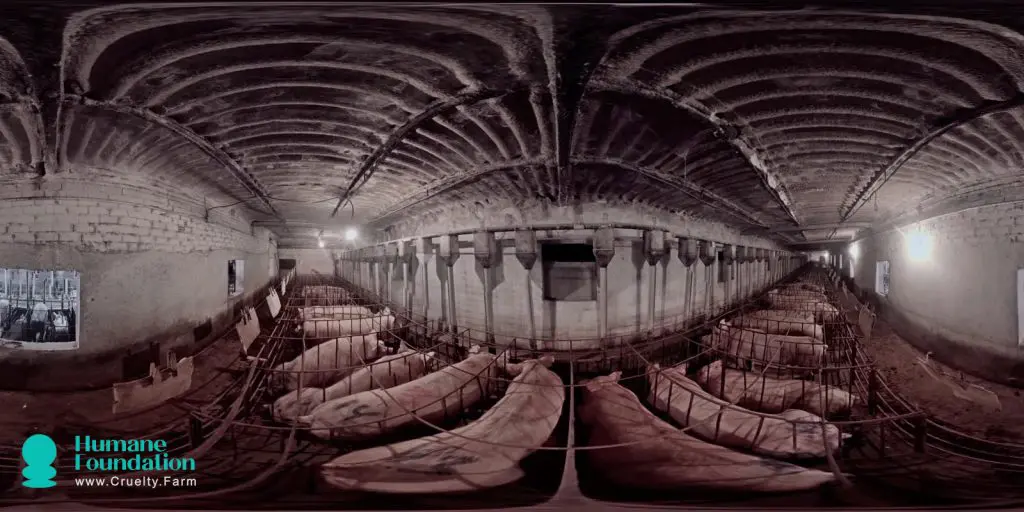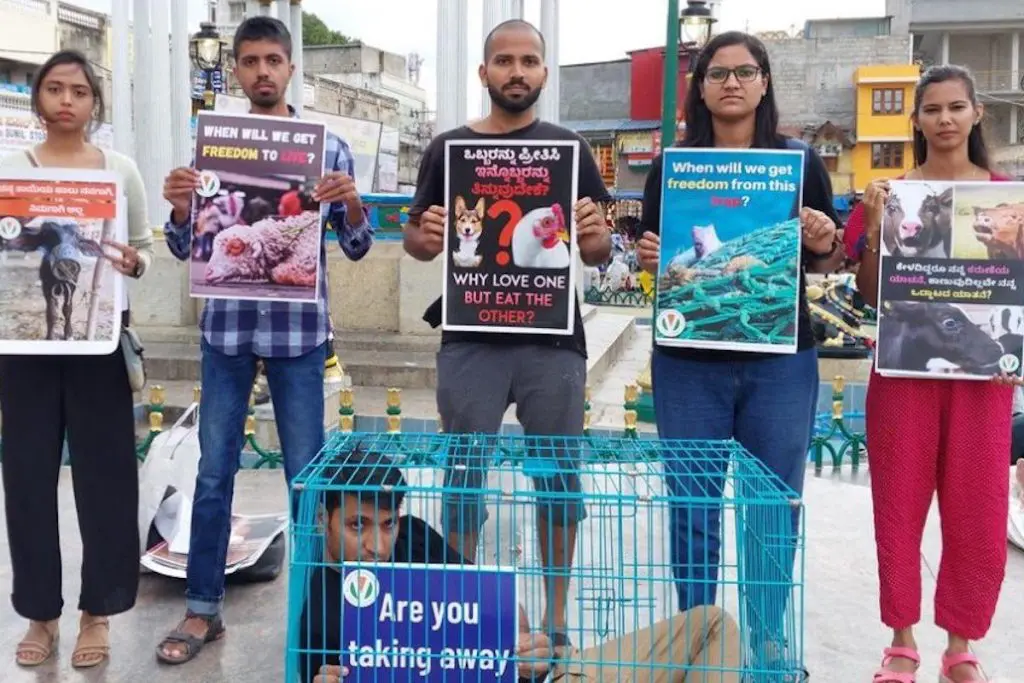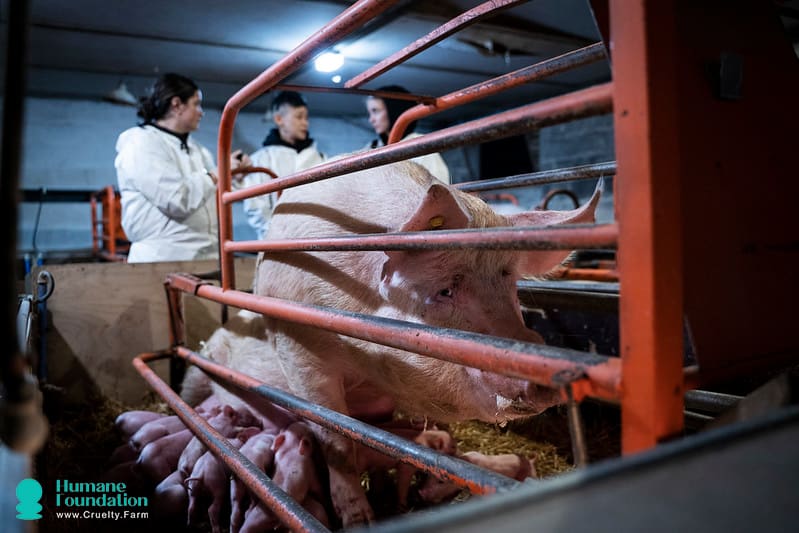Îstismara heywanan mijareke girîng e ku demek dirêj e di bêdengiyê de hatiye veşartin. Her çend civak ji refah û mafên heywanan bêtir haydar bûye jî, zilmên ku li pişt deriyên girtî yên li zeviyên kargehê diqewimin, bi piranî ji çavê raya giştî veşartî dimînin. Îstismara û îstismara heywanan di van tesîsan de bûye norm di lêgerîna hilberîna girseyî û qezencê de. Lêbelê, êşa van mexlûqên bêguneh êdî nayê paşguh kirin. Dem hatiye ku bêdengî were şikandin û ronî li ser rastiya acizker a îstismara heywanan di zeviyên kargehê de were avêtin. Ev gotar dê bikeve cîhana tarî ya çandiniya kargehê û cûrbecûr celebên îstismara ku di nav van tesîsan de diqewimin bikole. Ji îstismara laşî û psîkolojîk bigire heya paşguhkirina hewcedariyên bingehîn û şert û mercên jiyanê, em ê rastiyên dijwar ên ku heywan di vê pîşesaziyê de dikişînin eşkere bikin. Wekî din, em ê li ser bandorên exlaqî û exlaqî yên van pratîkan û encamên potansiyel ên ji bo jîngeh û tenduristiya me nîqaş bikin. Di dawiyê de, berpirsiyariya me wekî civak e ku em li zeviyên kargehê dermankirina nemirovane ya heywanan çareser bikin û dawî li wê bînin.
Rastiya li pişt çandiniya fabrîkî eşkere dike
Çandiniya kargehê, rêbazek berfireh a hilberîna girseyî di sektora çandiniyê de, demek dirêj e ku mijara fikar û nakokiyan e. Her çend armanc ew e ku daxwaza zêde ya ji bo berhemên heywanan bicîh bîne jî, şert û mercên ku heywan di van çewlikan de têne xwedîkirin û dermankirin pir caran ji çavê raya giştî veşartî dimînin. Rastî ev e ku çandiniya kargehê pirsgirêkên girîng ên başiya heywanan bi xwe re tîne, di nav de qerebalixî, şert û mercên jiyanê yên nepaqij, karanîna hormon û antîbiyotîkan, û pratîkên hovane yên wekî jêkirina nîskan û qutkirina dûvikê. Bi ronîkirina van aliyên veşartî, eşkere dibe ku çandiniya kargehê pirsên exlaqî yên cidî derdixe holê û ji bo çareserkirina û sererastkirina îstismara heywanan a berbelav a di van tesîsan de, ji nû ve nirxandinek pratîkên me yên heyî hewce dike.

Refaha heywanan di xetereyê de ye: çandiniya fabrîkî
Di warê çandiniya fabrîkî de, bê guman refaha heywanan di xetereyê de ye. Xwezaya dijwar a vê rêbaza çandiniyê karîgerî û qezencê dide pêşiyê, pir caran li ser hesabê refaha heywanên têkildar. Heywan di cîhên piçûk û teng de têne sînordarkirin, ku dibe sedema stres, nexweşî û birîndarbûnê. Gelek ji wan bêyî anesteziya têr an kêmkirina êşê rastî prosedurên bi êş ên wekî jêkirina nîskê û qutkirina dûvikê tên. Wekî din, karanîna hormon û antîbiyotîkan ji bo pêşvebirina mezinbûnê û pêşîgirtina li nexweşiyan tenduristî û tevgera xwezayî ya van heywanan bêtir dixe xeterê. Hovîtiya xwerû û paşguhkirina refaha heywanan di çandiniya fabrîkî de hewceyê baldariyek û çalakiyek tavilê ye da ku piştrast bikin ku ev pratîk têne terikandin û alternatîfên mirovîtir û domdartir têne bikar anîn.
Rastiya tarî ya çandiniya fabrîkî
Çandiniya fabrîkî rastiyek tarî didomîne ku nayê paşguhkirin. Heywanên ku di van şert û mercan de têne xwedîkirin rastî êş û îstismara bêhempa tên. Jîngehên qerebalix û nepaqij ên ku ew tê de têne girtin, dibin sedema tengasiyeke mezin a fîzîkî û psîkolojîk. Ji van heywanan re mafê tevlîbûna tevgerên xwezayî, wek ger û çêrandin, nayê dayîn û di şûna wê de di pergaleke pîşesaziyê ya ku ji bo qezencê tê ajotin de tenê wekî kelûpel têne kêmkirin. Bikaranîna pergalên dorpêçkirinê, wek qefesên ducaniyê û qefesên bateriyê, tevgera wan bêtir sînordar dike û bextreşiya wan girantir dike. Wekî din, pratîkên rûtîn ên jêkirina hestiyan, kastrasyon û rakirina nîskê bêyî kêmkirina êşê ya têrker têne kirin, ku dibin sedema êş û tengahiyên mezin. Pêdivî ye ku em bi rastiya tarî ya çandiniya fabrîkî re rûbirû bibin û tedbîrên biryardar bigirin da ku îstismara sîstemîk a heywanan a ku di van operasyonan de diqewime çareser bikin.

Zilm û zordarî li pişt deriyên girtî veşartî ye
Di nav sînorên zeviyên kargehê de, rastiyek acizker û dilşikestî derdikeve holê, ku ji çavê raya giştî veşartî ye. Li pişt deriyên girtî, heywan zilmek bêhempa dikişînin. Îstîsmara sîstematîk û êşa ku li ser van hebûnên bêparastin tê kirin mijarek e ku hewceyê baldariyek lezgîn e. Perdeya nepenîtiyê ya li dora zeviyên kargehê rê dide berdewamiya kiryarên nemirovane, ku pir caran ji ber qezenc û karîgeriyê têne rêve kirin. Refaha hestyarî û laşî ya heywanan nayê hesibandin, ji ber ku ew wekî tiştên tenê têne dermankirin ne wekî hebûnên hişmend ên ku dikarin êş û tirsê biceribînin. Berpirsiyariya me ye ku em vê zilma veşartî ronî bikin û ji bo maf û refaha heywanên ku di nav van pergalên zordar de girtî ne parêzvaniyê bikin.
Zêdegavî berbelav di çandiniya fabrîkî de
Belavbûna îstismara di operasyonên çandiniya kargehê de mijarek pir xemgîn û berbelav e ku nayê paşguh kirin. Lêpirsînên veşartî yên bêhejmar û raporên agahiyê bûyerên şokker ên hovîtî, paşguhkirin û muameleya xerab a li hember heywanan di van tesîsan de eşkere kirine. Ji şert û mercên jiyanê yên qerebalix û nepaqij bigire heya pratîkên rûtîn ên wekî rakirina nîskan, qutkirina dûvikê û kastrasyonê bêyî anesteziyê, başiya heywanan bi berdewamî di xetereyê de ye. Lêgerîna herî zêde qezenckirinê û bicîhanîna daxwazên bilind pir caran li ser muameleya exlaqî ya van afirîdên hişmend girîngtir e. Ev îstismara berbelav ne tenê prensîbên bingehîn ên dilovanî û rêzgirtina ji bo jiyanê binpê dike, lê di heman demê de fikarên girîng ên exlaqî û etîkî jî derdixe holê ku divê werin çareser kirin.

Çima divê em bibêjin
Pêwîst e ku em bêdengiya li ser mijara îstismara heywanan li zeviyên kargehê bişkînin. Bêdeng man pergalekê didomîne ku qezencê li ser refah û rûmeta zindiyan dide pêş. Bi dengê bilind, em xwedî hêz in ku hişyariyê biafirînin, guhertinê bimeşînin û kesên berpirsiyarê van kiryarên hovane hesab bipirsin. Dengên me dikarin qîrîna heywanên êş dikişînin zêde bikin û balê bikişînin ser pêwîstiya lezgîn a reformê di pîşesaziya çandiniyê de. Bi şikandina bêdengiyê, em ronî dikin ser quncikên tarî yên ku ev îstismar lê diqewimin, civakê neçar dikin ku bi rastiyên nerehet re rû bi rû bimînin û di derbarê xwarina ku em dixwin de hilbijartinên agahdar bikin. Dengbêjî ne tenê mecbûriyetek exlaqî ye, lê gavek pêwîst e ber bi avakirina pêşerojek dilovantir û domdartir ji bo hem heywanan û hem jî mirovan.
Pêdiviya lezgîn ji bo guhertinê
Çareserkirina pêwîstiya lezgîn a guhertinê di çandiniyên kargehê de ji ber çend sedeman girîng e. Pêşî, îstismara heywanan a berbelav û pir caran veşartî ku di van tesîsan de diqewime ne tenê li dijî prensîbên exlaqî ye, lê di heman demê de nirxên me yên civakî yên dilovanî û empatiyê jî nakok dike. Em nikarin çavên xwe ji êşa heywanên bêguneh ên ku di cîhên teng de asê mane, rastî kiryarên hovane hatine, û ji pêdiviyên bingehîn ên wekî xwarina rast û lênêrîna veterîneriyê hatine bêparkirin bigirin. Ya duyemîn, bandora jîngehê ya çandiniya kargehê ne domdar e û dibe sedema guherîna avhewayê, birîna daristanan û qirêjiya avê. Rêbazên heyî yên ku di van çandiniyan de têne bikar anîn ne tenê ji bo başiya heywanan zirardar in, lê di heman demê de gefên girîng li tenduristiya gerstêrka me jî çêdikin. Wekî din, fikarên cidî di derbarê ewlehî û kalîteya xwarina ku di çandiniyên kargehê de tê hilberandin de hene, ji ber ku şert û mercên qerebalix û nepaqij dikarin bibin sedema belavbûna nexweşiyan ku dikarin bandorê li tenduristiya mirovan bikin. Pêdivî ye ku em van pirsgirêkan qebûl bikin û çareser bikin, ji bo guhertina awayê dermankirina heywanan, pratîkên jîngehê yên ku têne bikar anîn, û zelalî û berpirsiyariya giştî di nav pîşesaziyê de piştgirî bikin. Bi pêşanî dayîna başiya heywanan, parastina jîngeha me, û tenduristî û ewlehiya xerîdaran, em dikarin rê li ber pêşerojek domdartir û dilovantir vekin.
Eşkerekirina tirsên îstismarê
Bi hişmendî û pabendbûna zêde ya ji bo başiya heywanan, ronîkirina li ser tirsên pir caran veşartî yên îstismara li zeviyên kargehê dibe mecbûrî. Ev rastiya tarî muameleya sîstematîk a xerab a heywanan vedihewîne, ku dibe sedema êş û neheqiyek mezin. Bi eşkerekirina van wehşetan, em dikarin diyalogek pêwîst bidin destpêkirin û ji bo guhertinek watedar di nav pîşesaziyê de zext bikin. Bi lêpirsînên berfireh, agahderan û hewldanên parêzvaniyê, em dikarin hêdî hêdî bêdengiya li dora îstismara heywanan bişkînin, piştrast bikin ku dengê bêdeng tê bihîstin û mafên wan têne parastin. Bi saya vê hewldana kolektîf e ku em dikarin ji bo afirandina pêşerojek dilovantir û exlaqîtir hewl bidin, pêşerojek ku îstismar û hovîtiya li ser heywanan li zeviyên kargehê êdî nayê tehmûlkirin.
Çavê xwe kor neke
Dema ku em dest bi rêwîtiya çareserkirina îstismara heywanan li zeviyên kargehê dikin, pir girîng e ku em çavên xwe ji rastiyên dijwar ên ku di nav van saziyan de hene negirin. Bi hilbijartina paşguhkirin an redkirina delîlên muameleya xirab û hovîtiyê, em çerxek neheqiyê didomînin û dibin sedema êşa bêhejmar heywanan. Di şûna wê de, divê em bi rastiyên nerehet re rûbirû bibin û bi awayekî çalak li rêyên pêşvebirina şefafî û berpirsiyariyê di pîşesaziyê de bigerin. Bi redkirina çavên xwe girtin, em dikarin bibin katalîzatorên guhertinê û ji bo afirandina pêşerojek bixebitin ku tê de refaha heywanan di pergalên hilberîna xwarinê yên me de pêşîniyek sereke be.

Tevlî têkoşîna li dijî tundiyê bibin
Bi berçavgirtina eşkerekirinên xemgîn ên derbarê îstismara heywanan li fermên kargehê de, pir girîng e ku em bi hev re bibin yek û beşdarî têkoşîna li dijî vê muameleya xirab a tirsnak bibin. Bi helwestek li dijî îstismarê, em xwedî hêz in ku bandorek girîng li ser jiyana van heywanên bêguneh bikin. Tenê qebûlkirina pirsgirêkê têrê nake; divê em bi awayekî çalak ji bo pêkanîna guhertinên girîng di pîşesaziyê de bixebitin da ku başbûn û muameleya mirovî ya hemî heywanên têkildar misoger bikin. Bi yekkirina dengên xwe û parêzvaniya rêziknameyên hişktir, çavdêriya çêtir û şefafiyeteke mezintir, em dikarin bêdengiya li dora îstismara heywanan bişkînin û rê li ber pêşerojek dilovantir û exlaqîtir di çandiniya kargehê de vekin. Bi hev re, em bibin katalîzatorên guhertinê û cîhanek biafirînin ku hemî heywan bi rêz û rûmeta ku heq dikin werin dermankirin.
Di encamê de, pir girîng e ku em mijara îstismara heywanan li zeviyên kargehê çareser bikin û ji bo afirandina pratîkên mirovîtir û exlaqîtir di nav pîşesaziyê de bixebitin. Bi perwerdekirina xwe û yên din li ser rastiyên çandiniya kargehê û parêzvaniya rêzikname û çavdêriya hişktir, em dikarin bibin alîkar ku jiyana bi mîlyonan heywanên ku di van şert û mercên nemirovane de cefayê dikişînin baştir bibe. Werin em bêdengiyê bişkînin û ji bo afirandina pêşerojek dilovantir û domdartir ji bo hemî hebûnan tevbigerin.
پرسیارە دووبارەکان
Hin ji awayên hevpar ên îstismara heywanan ên ku li çewlikên kargehê diqewimin çi ne?
Hin awayên hevpar ên îstismara heywanan li zeviyên kargehê ev in: qerebalixî, nebûna xwarin û ava guncaw, dorpêçkirina di qefes an sanduqên piçûk de, îstismara laşî, paşguhkirina lênihêrîna bijîşkî, û şert û mercên jiyanê yên neasayî ku rê li ber nîşandana tevgerên xwezayî yên heywanan digirin. Ev kiryar pir caran dibin sedema êş, stres û pirsgirêkên tenduristiyê yên mezin ji bo heywanên têkildar.
Xerîdar çawa dikarin bibin alîkar ku îstismara heywanan li zeviyên kargehê were çareserkirin û pêşî lê were girtin?
Xerîdar dikarin bi hilbijartina piştgirîkirina pratîkên çandiniyê yên exlaqî û domdar ên wekî kirîna hilberên herêmî, organîk û bi awayekî mirovî hatine xwedîkirin, di çareserkirina û pêşîgirtina li îstismara heywanan li zeviyên kargehê de bibin alîkar. Wekî din, parêzvaniya rêziknameyên hişktir li ser zeviyên kargehê, piştgirîkirina rêxistinên parastina heywanan û kêmkirina xerckirina goşt jî dikare bibe alîkar ku îstismara heywanan di pîşesaziyê de kêm bibe. Bi kirina hilbijartinên agahdartir û zêdekirina hişmendiyê li ser vê pirsgirêkê, xerîdar dikarin rolek girîng di pêşvebirina muameleya çêtir a heywanan li zeviyên kargehê de bilîzin.
Hin bandorên psîkolojîk ên xebatê an jî şahidiya îstismara heywanan li çewlikên fabrîkî çi ne?
Şahidiya îstismara heywanan li zeviyên kargehê an jî xebata di wan de dikare bibe sedema tengasiyên psîkolojîk ên wekî sûcdarî, fikar, depresyon û bêhesasiyeta li hember tundûtûjiyê. Kes dikarin nakokiya exlaqî, westandina dilovaniyê û nîşanên stresê yên piştî trawmayê biceribînin. Ev rûbirûbûn di heman demê de dikare bibe sedema kêmbûna hesta empatiyê û zêdebûna xetera pêşxistina pirsgirêkên tenduristiya derûnî. Nelihevhatina kognîtîv di navbera baweriyên kesane û berpirsiyariyên kar de dikare zexta hestyarî û dilemayên exlaqî hîn xirabtir bike. Bi tevayî, bandora psîkolojîk a tevlîbûn an rûbirûbûna îstismara heywanan li zeviyên kargehê dikare kûr û demdirêj be.
Rêziknameyên hikûmetê di pêşîgirtina li îstismara heywanan li çewlikên kargehê de çi rol dilîzin?
Rêziknameyên hikûmetê bi danîna standardên ji bo refaha heywanan, pêkanîna vekolînan ji bo misogerkirina pabendbûnê, û sepandina cezayên ji bo binpêkirinan, di pêşîgirtina li îstismara heywanan li zeviyên kargehê de roleke girîng dilîzin. Ev rêzikname dibin alîkar ku standardên herî kêm ên lênêrîna heywanan, wek xanîkirina guncaw, xwarin û lênêrîna veterîneriyê, werin destnîşankirin. Bi hesabpirsîna zeviyên kargehê û bicîhanîna van rêziknameyan, hikûmet armanc dikin ku bûyerên îstismar û îhmalkirina heywanan di pîşesaziya çandiniyê de kêm bikin. Lêbelê, bandora van rêziknameyan dikare li gorî mekanîzmayên bicîhanînê, şefafî û hişmendiya giştî biguhere.
Çawa kes û rêxistin dikarin bi hev re bixebitin da ku bêdengiya li dora îstismara heywanan li zeviyên kargehê bişkînin?
Kes dikarin bi rêya medyaya civakî, daxwaznameyan û xwepêşandanên aştiyane hişyariyê bilind bikin, di heman demê de rêxistin dikarin ji bo rêziknameyên hişktir lobiyê bikin, lêpirsînan bikin û piştgirî bidin kesên ku îstîsmara li ser heywanan dikin. Bi hevkariyê û parvekirina çavkaniyan, ew dikarin hewildanên xwe zêde bikin û dengek bihêz li dijî îstîsmara heywanan li zeviyên kargehê biafirînin. Kampanyayên perwerdehiyê, hevkariyên bi dezgehên medyayê re û têkiliya bi siyasetmedaran re jî rêbazên bi bandor in ku vê pirsgirêkê ronî bikin û guhertinê pêk bînin. Bi hevkariya xwe, kes û rêxistin dikarin ji bo standardên başkirina refaha heywanan parêzvaniyê bikin û di dawiyê de bêdengiya li dora îstîsmara heywanan li zeviyên kargehê bişkînin.















































